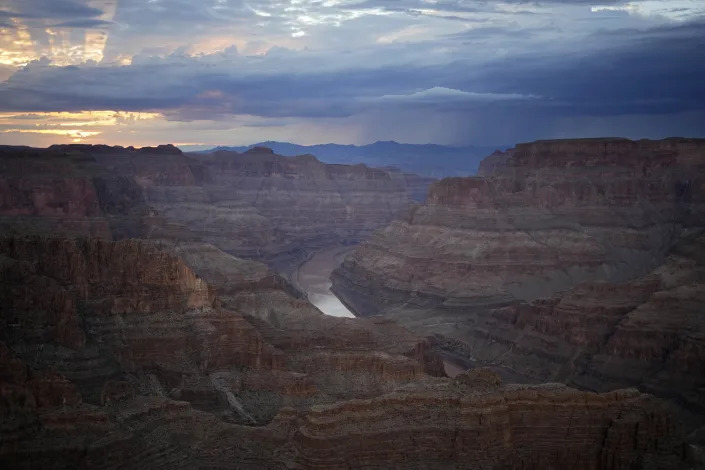
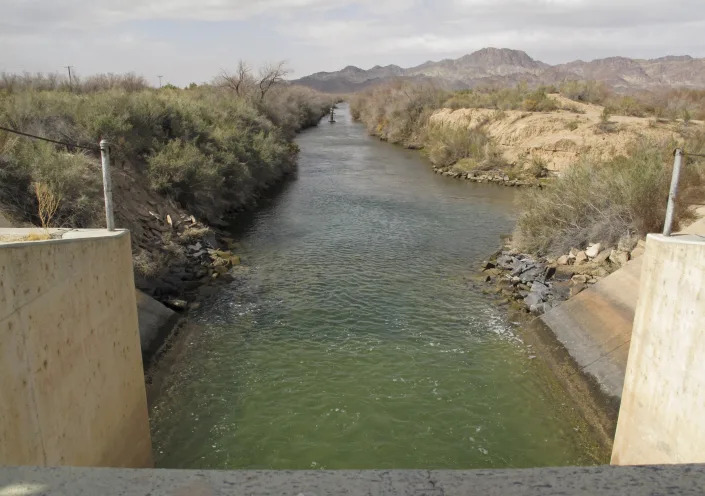
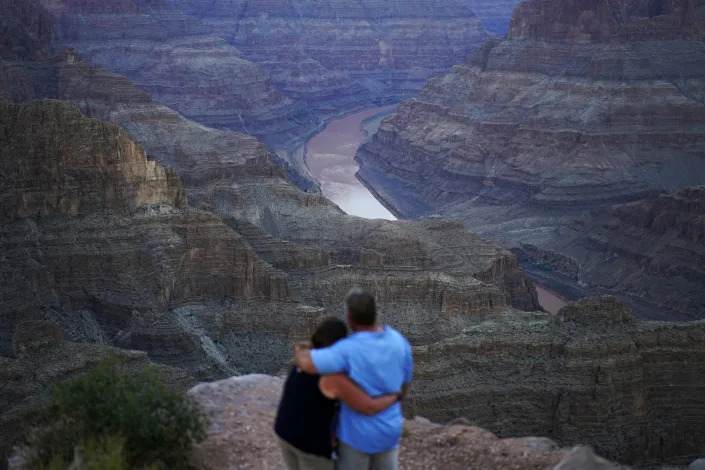
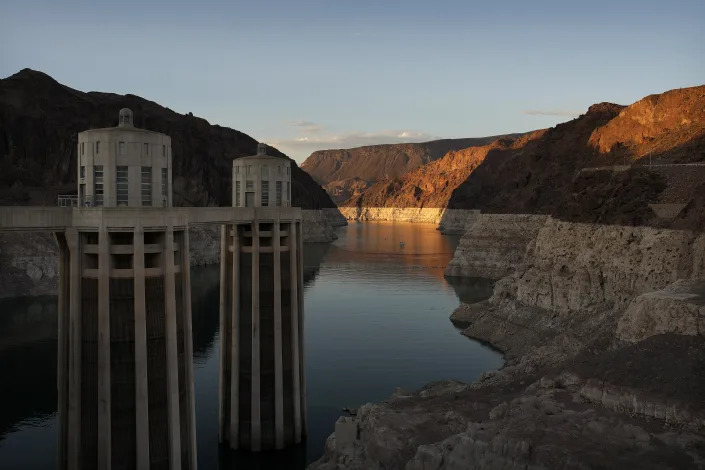
A bathtub ring of light minerals shows the high water line of Lake Mead near water intakes on the Arizona side of Hoover Dam at the Lake Mead National Recreation Area Sunday, June 26, 2022, near Boulder City, Nev. The words "dead pool" surfaced this week as officials described the possibility that lake levels could shrink so much that neither dam would be able to release water downstream. The first weeks of 2023 will be crucial for Southwest U.S. states and water entities to agree how to use less water from the drought-stricken and fast-shrinking Colorado River, a top federal water manager said Friday, Dec. 16, 2022.
(AP Photo/John Locher, File)
FELICIA FONSECA
Thu, January 5, 2023
FLAGSTAFF, Ariz. (AP) — A Native American tribe that has one of the largest and most secure rights to Colorado River water now has approval to lease some of it in Arizona, a state that’s been hardest hit by cuts to its water supply and is on a perpetual search for more.
President Joe Biden signed legislation Thursday giving leasing authority to the Colorado River Indian Tribes, whose reservation tracks its namesake on the Arizona-California border. Biden also approved a water rights settlement for the Hualapai Tribe and authorized additional funding to complete water projects for the White Mountain Apache Tribe.
The Colorado River Indian Tribes passed a resolution in 2020 to seek the federal legislation to help bolster the tribe’s economy and improve housing, health care and education on the reservation. Revenue from water leases also will help fund a nursing home, substance abuse treatment and improve an irrigation system, tribal leaders have said.
The tribe has the right to divert more than 662,000 acre-feet of Colorado River water in Arizona but hasn’t taken full advantage because it lacks the infrastructure. It also has rights to nearly 57,000 acre-feet of water in California. An acre-foot is enough to serve roughly two to three households annually.
The tribe’s leasing authority is limited to its water rights in Arizona and more so by what's already being used for farming. Tribal Chairwoman Amelia Flores said the legislation was designed that way to avoid further straining the river that’s been dwindling because of overuse, climate change and an unrelenting drought.
Already, the tribe has committed to leaving water in Lake Mead — the largest human-made reservoir in the U.S. West — to help ensure Hoover Dam can continue generating power and deliver water to Arizona, California, Nevada and Mexico in the lower Colorado River basin. Flores said the tribe will work with its farm managers and talk to the community to determine the amount of water that can be leased, the price for the water and the length of the leases.
Flores suggested the leases won’t be as long as the 50-year terms that the U.S. Bureau of Indian Affairs offered for farming on the tribe’s reservation.
“I do not believe, and I think I speak for others on the Council, that we have the foresight to know what is best for our members who are not yet born or for their children,” she said.
Cities in metropolitan Phoenix and Tucson, as well as other Native American tribes who get water from a series of canals managed by the Central Arizona Project, are among the likely customers for water leases with the Colorado River Indian Tribes.
Flores said the tribe is committed to helping its neighbors and maintaining the habitat along the river as water becomes more scarce and others face deeper cuts.
The Colorado River serves 40 million people in Wyoming, Colorado, Utah, New Mexico, Arizona, California and Nevada. Mexico also gets a share. Mandatory shortages are affecting some states, and the U.S. Bureau of Reclamation has called for more widespread cuts as key reservoirs shrink.
The Hualapai Tribe also secured the right to lease water as part of its settlement in the lower Colorado River basin. The tribe now can divert 3,414 acre-feet of water per year from the Colorado River. But it's also at risk of having water curtailed because it’s a lower-tier right.
“The fourth-priority was only part of the whole negotiations, and we walked into it with our heads held up high because at least it’s water,” said former Hualapai Chairman Damon Clarke. “In that sense, it’s good. In another sense, that’s not good.”
Still, the tribe called Biden’s signature a historic step for the Hualapai people, whose reservation borders a 108-mile (174-kilometer) stretch of the Colorado River through the Grand Canyon.
“This is a life-changing moment for the Hualapai Tribe and the many members of the Tribal Council who have worked toward this goal for more than a decade,” tribal Vice Chairman Scott Crozier said in a statement Thursday.
The legislation includes more than $310 million for the Hualapai tribe to build out a water delivery system. It has long relied on groundwater to serve its communities and its major tourist operation, Grand Canyon West that’s outside the boundaries of Grand Canyon National Park.
The tribe secured water rights to a Colorado River tributary in 2014 through another federal water rights settlement. The federal government has approved about 40 such settlements with tribes, some of which include more than one tribe. Tribes often trade potentially huge water claims for the promise of federal funding to deliver water to their citizens.
The third bill that Biden signed amends a 2010 water rights settlement for the White Mountain Apache Tribe in eastern Arizona, authorizing additional funding and extending deadlines to complete a rural water system and dam.
___
Fonseca covers Indigenous communities on the AP's Race and Ethnicity team. Follow her on Twitter: @FonsecaAP
FELICIA FONSECA
Thu, January 5, 2023
FLAGSTAFF, Ariz. (AP) — A Native American tribe that has one of the largest and most secure rights to Colorado River water now has approval to lease some of it in Arizona, a state that’s been hardest hit by cuts to its water supply and is on a perpetual search for more.
President Joe Biden signed legislation Thursday giving leasing authority to the Colorado River Indian Tribes, whose reservation tracks its namesake on the Arizona-California border. Biden also approved a water rights settlement for the Hualapai Tribe and authorized additional funding to complete water projects for the White Mountain Apache Tribe.
The Colorado River Indian Tribes passed a resolution in 2020 to seek the federal legislation to help bolster the tribe’s economy and improve housing, health care and education on the reservation. Revenue from water leases also will help fund a nursing home, substance abuse treatment and improve an irrigation system, tribal leaders have said.
The tribe has the right to divert more than 662,000 acre-feet of Colorado River water in Arizona but hasn’t taken full advantage because it lacks the infrastructure. It also has rights to nearly 57,000 acre-feet of water in California. An acre-foot is enough to serve roughly two to three households annually.
The tribe’s leasing authority is limited to its water rights in Arizona and more so by what's already being used for farming. Tribal Chairwoman Amelia Flores said the legislation was designed that way to avoid further straining the river that’s been dwindling because of overuse, climate change and an unrelenting drought.
Already, the tribe has committed to leaving water in Lake Mead — the largest human-made reservoir in the U.S. West — to help ensure Hoover Dam can continue generating power and deliver water to Arizona, California, Nevada and Mexico in the lower Colorado River basin. Flores said the tribe will work with its farm managers and talk to the community to determine the amount of water that can be leased, the price for the water and the length of the leases.
Flores suggested the leases won’t be as long as the 50-year terms that the U.S. Bureau of Indian Affairs offered for farming on the tribe’s reservation.
“I do not believe, and I think I speak for others on the Council, that we have the foresight to know what is best for our members who are not yet born or for their children,” she said.
Cities in metropolitan Phoenix and Tucson, as well as other Native American tribes who get water from a series of canals managed by the Central Arizona Project, are among the likely customers for water leases with the Colorado River Indian Tribes.
Flores said the tribe is committed to helping its neighbors and maintaining the habitat along the river as water becomes more scarce and others face deeper cuts.
The Colorado River serves 40 million people in Wyoming, Colorado, Utah, New Mexico, Arizona, California and Nevada. Mexico also gets a share. Mandatory shortages are affecting some states, and the U.S. Bureau of Reclamation has called for more widespread cuts as key reservoirs shrink.
The Hualapai Tribe also secured the right to lease water as part of its settlement in the lower Colorado River basin. The tribe now can divert 3,414 acre-feet of water per year from the Colorado River. But it's also at risk of having water curtailed because it’s a lower-tier right.
“The fourth-priority was only part of the whole negotiations, and we walked into it with our heads held up high because at least it’s water,” said former Hualapai Chairman Damon Clarke. “In that sense, it’s good. In another sense, that’s not good.”
Still, the tribe called Biden’s signature a historic step for the Hualapai people, whose reservation borders a 108-mile (174-kilometer) stretch of the Colorado River through the Grand Canyon.
“This is a life-changing moment for the Hualapai Tribe and the many members of the Tribal Council who have worked toward this goal for more than a decade,” tribal Vice Chairman Scott Crozier said in a statement Thursday.
The legislation includes more than $310 million for the Hualapai tribe to build out a water delivery system. It has long relied on groundwater to serve its communities and its major tourist operation, Grand Canyon West that’s outside the boundaries of Grand Canyon National Park.
The tribe secured water rights to a Colorado River tributary in 2014 through another federal water rights settlement. The federal government has approved about 40 such settlements with tribes, some of which include more than one tribe. Tribes often trade potentially huge water claims for the promise of federal funding to deliver water to their citizens.
The third bill that Biden signed amends a 2010 water rights settlement for the White Mountain Apache Tribe in eastern Arizona, authorizing additional funding and extending deadlines to complete a rural water system and dam.
___
Fonseca covers Indigenous communities on the AP's Race and Ethnicity team. Follow her on Twitter: @FonsecaAP
Biden signs bills that secure long-sought water rights and land for 5 Arizona tribes
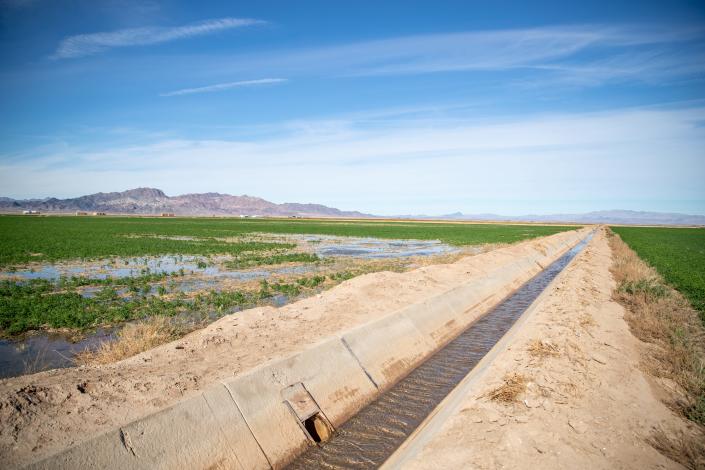
In eastern Arizona, the White Mountain Apache Tribe Water Rights Quantification Act amends a 2010 water rights settlement for the 15,000-member tribe. It authorizes federal funding and extends the time the tribe needed to complete its rural water system and Miner Flat Fam project.
“On behalf of the White Mountain Apache Tribe, I would like to thank Senator Kelly and Senator Sinema for their leadership in securing passage of this legislation in the Senate," said White Mountain Apache Tribe Chairman Kasey Velasquez. "The legislation would provide the necessary funding to provide desperately needed drinking water on the Fort Apache Reservation and resolve the tribe’s water related claims against the United States and others."
The three water bills were sponsored by Arizona's two senators, Kyrsten Sinema and Mark Kelly. Flores noted that her tribe's bill was backed by other lawmakers, including Rep. Paul Gosar (R-Ariz.) and Rep. Raúl Grijalva (D-Ariz.). Former Rep. Tom O'Halleran sponsored two of the three water bills that passed the full Congress.
“As Arizona and the West navigate this historic drought that often hits tribal communities the hardest, the passage of these three bills could not be more significant," said Kelly.
Sinema added that, by working with colleagues on both sides of the aisle, "we ensured critical priorities for Arizona’s tribal communities would not fall victim to partisanship. Passage of these bills will help ensure continued economic growth and water certainty for tribal communities across Arizona.”
Tribal water: Their pleas for water were long ignored. Now tribes are gaining a voice on the Colorado River
Pascua Yaqui, Gila River Indian Community gain new lands
Two other bills, the Old Pascua Community Land Acquisition Act and the Blackwater Trading Post Land Transfer Act, were signed in December. Although each put only small tracts of land into to trust for the Pascua Yaqui Tribe and the Gila River Indian Community, they each hold historical significance for the two tribal communities.
The Yaqui Tribe released a statement saying that its bill confirmed a 2021 gaming compact agreement between the 19,000-member tribe and the state to place about 30 acres of land in South Tucson into trust. The land is called the Old Pascua Village and contains churches, sacred sites, and ceremonial grounds that are culturally significant to the Pascua Yaqui people.
The Old Pascua Museum and Yaqui Cultural Center is also in the village, which is recognized as the original Yaqui settlement established after tribal members fled persecution in their native Mexico.
“This bill is necessary in order to create additional economic opportunities for the Pascua Yaqui Tribe of Arizona and its members,” Yaqui Chairman Peter Yucupicio said after approval in the Senate. “The bill acknowledges the relationship between the Pascua Yaqui and the city of Tucson, is reflective of numerous stakeholder meetings and negotiations, and allows the tribe to preserve our traditional homelands while promoting economic opportunities and new housing options for the community.”
Grijalva congratulated the tribe with a Tweet after passage in the Senate.
The tribe did not answer inquiries about any plans to establish a third casino on part of the property.
The Blackwater Trading Post Land Transfer Act places about 55 acres of land on the Gila River community's east end into trust. The land is the site of the the historic Blackwater Trading Post, and was purchased by the tribe in 2010 when the trading post closed. The family who operated the trading post also had a small museum on the site, which contained more than 1,000 cultural items that tribal members had traded for supplies. Those items are now part of the collection at the community's Huhugam Heritage Center.
When the bill was introduced in 2021, Gila River Indian Community Gov. Stephen Roe Lewis thanked Arizona's Senate and House delegation. “This non-controversial legislation is important to the Community and to our members residing in District 1 of the Reservation," he said.
The legislation also prohibited gaming operations on the land.
A long drought:At Lake Powell, a 'front-row seat' to a drying Colorado River and an uncertain future
Debra Krol reports on Indigenous communities at the confluence of climate, culture and commerce in Arizona and the Intermountain West. Reach Krol at debra.krol@azcentral.com. Follow her on Twitter at @debkrol.
Coverage of Indigenous issues at the intersection of climate, culture and commerce is supported by the Catena Foundation
This article originally appeared on Arizona Republic: 5 Arizona tribes gain water rights, land from Biden legislation

Debra Utacia Krol, Arizona Republic
Fri, January 6, 2023
Five Arizona tribes celebrated after President Joe Biden signed legislation that secured water rights, funding to develop water infrastructure and historically important tribal lands.
Some tribes have been pushing for these bills for years, including the Colorado River Indian Tribes, which worked for more than two decades to secure the right to lease a portion of its Colorado River allotment. The bills were passed in the waning days of the 117th Congress.
The Colorado River Indian Tribes Water Resiliency Act, the Hualapai Tribe Water Rights Settlement Act, and the White Mountain Apache Tribe Water Rights Quantification Act were signed by Biden Jan. 5.
The Colorado River Indian Tribes, known as CRIT, had sought to lease part of its 719,248 acre-feet Colorado River allotment for more than 20 years, said CRIT Chairwoman Amelia Flores. The tribe has saved a portion of its allotment using conservation measures and will use the revenues from leasing it to help stabilize its economy and enable water service extensions to tribal members, she said.
CRIT, which operates a large farm and casino, also plans to improve its canal system and conserve even more water.
More importantly, Flores said, these measures will enable the tribe to help save the life of the river.
"The river's the person. The river can't speak for itself. And we as stewards need to step up and protect the river," she said.
The Mojave and Chemehuevi have lived in the Colorado River Valley and the surrounding lands for millennia, and in recent years, Navajo and Hopi people relocated to the area. All four tribal cultures hold water as the source of life.
"We're connected to the river," she said. "We're connected spiritually. We're connected with our religious ceremonies to to the Colorado River and to the habitat along along the river."
Further up the river, the Hualapai Tribe finally secured a small water settlement that will provide a huge boost to its economy and community. The settlement provides 4,000 acre-feet from the river and authorizes the construction of a pipeline and other infrastructure to deliver the water to the tribe's biggest enterprise, Grand Canyon West. Water will also be delivered to homes.
"The passage of the Hualapai Tribe Water Rights Settlement Act of 2022 is an historic step for the Hualapai people, who have lived along the Colorado River for millennia,” said Hualapai Tribe Vice-Chairman Scott Crozier.
The 2,300-member tribe had pushed for more than a decade to secure the allotment from the Colorado River. The tribe’s lands lie on the south side of the Grand Canyon along 108 miles of the river.
“This will secure our tribe’s future for generations,” Crozier said.
Fri, January 6, 2023
Five Arizona tribes celebrated after President Joe Biden signed legislation that secured water rights, funding to develop water infrastructure and historically important tribal lands.
Some tribes have been pushing for these bills for years, including the Colorado River Indian Tribes, which worked for more than two decades to secure the right to lease a portion of its Colorado River allotment. The bills were passed in the waning days of the 117th Congress.
The Colorado River Indian Tribes Water Resiliency Act, the Hualapai Tribe Water Rights Settlement Act, and the White Mountain Apache Tribe Water Rights Quantification Act were signed by Biden Jan. 5.
The Colorado River Indian Tribes, known as CRIT, had sought to lease part of its 719,248 acre-feet Colorado River allotment for more than 20 years, said CRIT Chairwoman Amelia Flores. The tribe has saved a portion of its allotment using conservation measures and will use the revenues from leasing it to help stabilize its economy and enable water service extensions to tribal members, she said.
CRIT, which operates a large farm and casino, also plans to improve its canal system and conserve even more water.
More importantly, Flores said, these measures will enable the tribe to help save the life of the river.
"The river's the person. The river can't speak for itself. And we as stewards need to step up and protect the river," she said.
The Mojave and Chemehuevi have lived in the Colorado River Valley and the surrounding lands for millennia, and in recent years, Navajo and Hopi people relocated to the area. All four tribal cultures hold water as the source of life.
"We're connected to the river," she said. "We're connected spiritually. We're connected with our religious ceremonies to to the Colorado River and to the habitat along along the river."
Further up the river, the Hualapai Tribe finally secured a small water settlement that will provide a huge boost to its economy and community. The settlement provides 4,000 acre-feet from the river and authorizes the construction of a pipeline and other infrastructure to deliver the water to the tribe's biggest enterprise, Grand Canyon West. Water will also be delivered to homes.
"The passage of the Hualapai Tribe Water Rights Settlement Act of 2022 is an historic step for the Hualapai people, who have lived along the Colorado River for millennia,” said Hualapai Tribe Vice-Chairman Scott Crozier.
The 2,300-member tribe had pushed for more than a decade to secure the allotment from the Colorado River. The tribe’s lands lie on the south side of the Grand Canyon along 108 miles of the river.
“This will secure our tribe’s future for generations,” Crozier said.
In eastern Arizona, the White Mountain Apache Tribe Water Rights Quantification Act amends a 2010 water rights settlement for the 15,000-member tribe. It authorizes federal funding and extends the time the tribe needed to complete its rural water system and Miner Flat Fam project.
“On behalf of the White Mountain Apache Tribe, I would like to thank Senator Kelly and Senator Sinema for their leadership in securing passage of this legislation in the Senate," said White Mountain Apache Tribe Chairman Kasey Velasquez. "The legislation would provide the necessary funding to provide desperately needed drinking water on the Fort Apache Reservation and resolve the tribe’s water related claims against the United States and others."
The three water bills were sponsored by Arizona's two senators, Kyrsten Sinema and Mark Kelly. Flores noted that her tribe's bill was backed by other lawmakers, including Rep. Paul Gosar (R-Ariz.) and Rep. Raúl Grijalva (D-Ariz.). Former Rep. Tom O'Halleran sponsored two of the three water bills that passed the full Congress.
“As Arizona and the West navigate this historic drought that often hits tribal communities the hardest, the passage of these three bills could not be more significant," said Kelly.
Sinema added that, by working with colleagues on both sides of the aisle, "we ensured critical priorities for Arizona’s tribal communities would not fall victim to partisanship. Passage of these bills will help ensure continued economic growth and water certainty for tribal communities across Arizona.”
Tribal water: Their pleas for water were long ignored. Now tribes are gaining a voice on the Colorado River
Pascua Yaqui, Gila River Indian Community gain new lands
Two other bills, the Old Pascua Community Land Acquisition Act and the Blackwater Trading Post Land Transfer Act, were signed in December. Although each put only small tracts of land into to trust for the Pascua Yaqui Tribe and the Gila River Indian Community, they each hold historical significance for the two tribal communities.
The Yaqui Tribe released a statement saying that its bill confirmed a 2021 gaming compact agreement between the 19,000-member tribe and the state to place about 30 acres of land in South Tucson into trust. The land is called the Old Pascua Village and contains churches, sacred sites, and ceremonial grounds that are culturally significant to the Pascua Yaqui people.
The Old Pascua Museum and Yaqui Cultural Center is also in the village, which is recognized as the original Yaqui settlement established after tribal members fled persecution in their native Mexico.
“This bill is necessary in order to create additional economic opportunities for the Pascua Yaqui Tribe of Arizona and its members,” Yaqui Chairman Peter Yucupicio said after approval in the Senate. “The bill acknowledges the relationship between the Pascua Yaqui and the city of Tucson, is reflective of numerous stakeholder meetings and negotiations, and allows the tribe to preserve our traditional homelands while promoting economic opportunities and new housing options for the community.”
Grijalva congratulated the tribe with a Tweet after passage in the Senate.
The tribe did not answer inquiries about any plans to establish a third casino on part of the property.
The Blackwater Trading Post Land Transfer Act places about 55 acres of land on the Gila River community's east end into trust. The land is the site of the the historic Blackwater Trading Post, and was purchased by the tribe in 2010 when the trading post closed. The family who operated the trading post also had a small museum on the site, which contained more than 1,000 cultural items that tribal members had traded for supplies. Those items are now part of the collection at the community's Huhugam Heritage Center.
When the bill was introduced in 2021, Gila River Indian Community Gov. Stephen Roe Lewis thanked Arizona's Senate and House delegation. “This non-controversial legislation is important to the Community and to our members residing in District 1 of the Reservation," he said.
The legislation also prohibited gaming operations on the land.
A long drought:At Lake Powell, a 'front-row seat' to a drying Colorado River and an uncertain future
Debra Krol reports on Indigenous communities at the confluence of climate, culture and commerce in Arizona and the Intermountain West. Reach Krol at debra.krol@azcentral.com. Follow her on Twitter at @debkrol.
Coverage of Indigenous issues at the intersection of climate, culture and commerce is supported by the Catena Foundation
This article originally appeared on Arizona Republic: 5 Arizona tribes gain water rights, land from Biden legislation
No comments:
Post a Comment